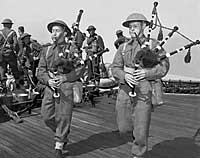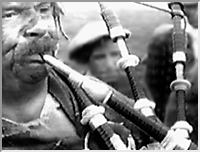Cal - 1984 - set in N. Ireland, has Uilleann pipes played by Liam O'Flynn. Paul Brady plays the whistle.
Casino Royale - 1967 131 minutes. This film is directed by John Huston (after many others tried their hands at directing it) and stars Peter Sellers (James Bond), with Woody Allan (nephew, Jimmy Bond) and David Niven (Sir James Bond). Clearly a spoof on the James Bond movies. The great highland bagpipes appear in three scenes:
- (1) Sir James Bond (David Niven) has been forced back into the British spy service by (among others) his old supervisor, M (John Huston). In his attempt to convince Bond to return to active duty, M orders an artillery shelling of Bond's estate, during which M is accidentally killed, leaving behind only his toupee. In a following scene, we see Bond approaching M's castle in Scotland, where he intends to deliver the toupee (M's remains) to the widow, Lady Fiona (Deborah Kerr), who is in fact impersonated by a SMERSH agent named Mimi. A bagpiper on the ramparts of the castle uses his instrument (which has a radio antenna sticking out of the front of the bag) to signal to Mimi that Bond is on his way, speaking into the base of the chanter. The sound of piping continues throughout his report to Mimi.
- (2) At a dinner party in M's castle to commemorate the deceased, several pipers get drunk (along with all the guests, save Bond) one by one and slump to the floor while piping, with chanters dropping out and drones groaning to silence.
- (3) Much later in the film, Evelyn Tremble (Peter Sellers), impersonating James Bond on a mission for the British spy service at a casino which serves as a front for SMERSH headquarters, is being tortured by Le Chiffre (Orson Welles) in an attempt to make Tremble give back a large sum of money which he won from Le Chiffre playing baccarat. Rather than inflicting physical pain, Le Chiffre operates a mind control device which induces weird hallucinations in Tremble. He finds himself in the midst of a bagpipe marching band (which includes a cameo by Peter O'Toole joking about Richard Burton), which apparently unsettles him, especially when the drummers menace him with their drum sticks. He is apparently saved by Vesper Lynd (Ursula Andress), who (under Sir James' instructions) had recruited Tremble to take on the spy mission, when she (also marching with the menacing pipers) mows all but Tremble down with her bagpipes, which have converted into a machine gun. She holds the chanter as a hand grip and the bullets fire from a hole in the front of the bag. Unfortunately for Tremble, she next shoots him as well. Although this apparently all happens as part of Tremble's induced hallucination, he appears to die from this experience as he is seen again in the movie only as an angel (complete with wings) wearing Scottish garb as the final credits roll by. In all, five pipebands appeared in the movie: Muirhead & Sons Ltd, Shotts & Dykehead, Edinburgh Police, Glasgow Police, and Invergordon.
Castle Ghosts of Scotland - 1996 (TV: BBC series) Depicts the story of a imprisoned piper who warns the MacDonald cheiftan of a planned Campbell ambush by playing his pipes. The cheiftan hears the warning tune and escapes capture. In retaliation, the Campbells chop off the piper's hands and he bleeds to death. The story goes on to tell of how his ghost haunts the castle and the moors playing his ghostly pipes.
Centennial (TV mini series) 1978 - This is a TV version of James Michener's book. Alexander McKieg, played by Richard Chamberlain, is at Bear Lake in Idaho at a mountain-man rendevous. Men are dancing in a circle when a piper emerges from the back of the crowd. McKieg, surprised to hear bagpipes so far away from his homeland of Scotland, begins to dance alone in the circle to the pipes. His best friend and former trapping partner, Pasquinel, played by Robert Conrad, who he had not seen for several years because of a dispute, steps out of the crowd and the two dance together in what is a memorable and powerful scene.
C'est pas parce qu'on a rien à dire qu'il faut fermer sa gueule - 1974 - Movie from Jacques Besnard contains bagpipes.
Chariots of Fire - 1981 123 minutes - Directed by High Hudson and starring Ben Cross and Ian Charleson, this film tells the stories of two former British track stars and is about the will to win. A piper plays Murdo's Wedding before one of Eric Liddle's track meets.
City Hall- 1995 - This Al Pacino thriller takes place in NYC with Pacino as the mayor. There is the de rigueur cop funeral with a lone piper playing on a hillside. The unknown piper is possibly from one of the NY Police bands but the piping is dubbed by PM Eric Rigler of the Los Angeles Police Pipe Band.
Coke Commercial (TV) - c. 1997 - Random Acts of Piping featuring the College of Wooster, Pipe Band of Ohio. The commercial started with them marching down a road (kilted), then showed some of thme sitting around in what looked like dorm room playing chanters, then showed them playing while marching unannounced into a swimming meet (one of the "random acts") wearing only swim suits. The tune throughout was Scotland the Brave.
Combat (TV series) - 1964 - This is a two-part episode entitled, What are the Bugles Blowin' For? In it, an American patrol is joined to a British patrol, both under a the British commander (a Lieutenant?). During one engagement, a British soldier is wounded or killed. One of the other British soldiers is a piper and marches back and forth playing Loch Lomond over and over, ad nauseam.

|
The Commandos strike at dawn - 1943 - John Farrow (Director), Paul Muni, Anna Lee, Lillian Gish, and Sedriwck Hardwick. This is a WW II propaganda film whose message seems a bit dated now, but the bagpipes were stirring.
Commitments - 1991 116 minutes - Directed by Alan Parker, starring Robert Arkins, Michael Aherne, etc. this movie tells the story of a band of young Dubliners playing 60's soul music in Ireland. The band was looking to recruit new musicians and a Uilleann piper showed up in answer to the ad. They didn't accept him. Great movie though. The credits list the piper as Brian McAodha.
Conan The Barbarian - the soundtrack had tunes that sounded remarkably like the Bothy Band's version of the Hag at the Churn from a CD called The Pipe On The Hob.
Confessions of a Driving Instructor - 1976 - This was one of a series of British sex comedies (some might say soft-porn comedies) made around that time and put on general release. This particular one concerned a driving instructor and his mainly bored-housewife pupils, but culminates in a car chase between his driving instruction car and the Bentley belonging to the irate father of one of his lady friends. As they hurtle down the road a pipe band appears from the other direction marching in the middle of the road, causing the cars to pass one either side at high speed. The speed of the pass is such that the pipers' kilts are all torn off by the slipstream and they are seen (from behind) marching into the distance with nothing but jock straps (sports supports) between the tops of their hose and the bottom of their doublets. This sets the taste and level of humor which runs throughout the film. The band involved is referred to in the credits as The Caledonian Highlanders. This however is a cover name used by Pipe Major Willie Cochran and Bob Murphy for bands they put together for jobs through their entertainment agency. They used many pipers from the London area for cabaret and television work but on this occasion hired the Stevenage Pipe Band to do the work. Cochrane and Murphy also appeared.
Cop Land - 1997 - A Sylvester Stallone film in which the pipes are heard playin My Home in background at a police funeral.

|
Culloden - 1964 - This a BBC documentary shown in the USA as the TV program, YOU ARE THERE. These programs attempted to recreate historic events, in this case, the Battle of Culloden, the failed rebellion of the Scots against the English which took place in 1745. Pipers are frequently employed on both sides of the battle in this recreation (there were, after all, as many Scots on the one side as the other), and the music (usually in the form of piobaireachd) is often additionally employed in the background. In the original battle, the pipes also appeared prominently. Indeed, it was this battle that caused them to be outlawed as an instrument of war. This documentary is very well done but is, unfortunately, in black and white. It was directed by Peter Walkins and its consultant was John Prebble, author of the books: Culloden (1961), The Highland Clearances (1963) and Glencoe (1966). The piper shown in the illustration to the right is John Hunt Leigh. At this point in the film, he is playing a piobaireachd. Not only was he a noted piper, he was also a Gaelic speaker and a craftsman par excellence of Highland goods.